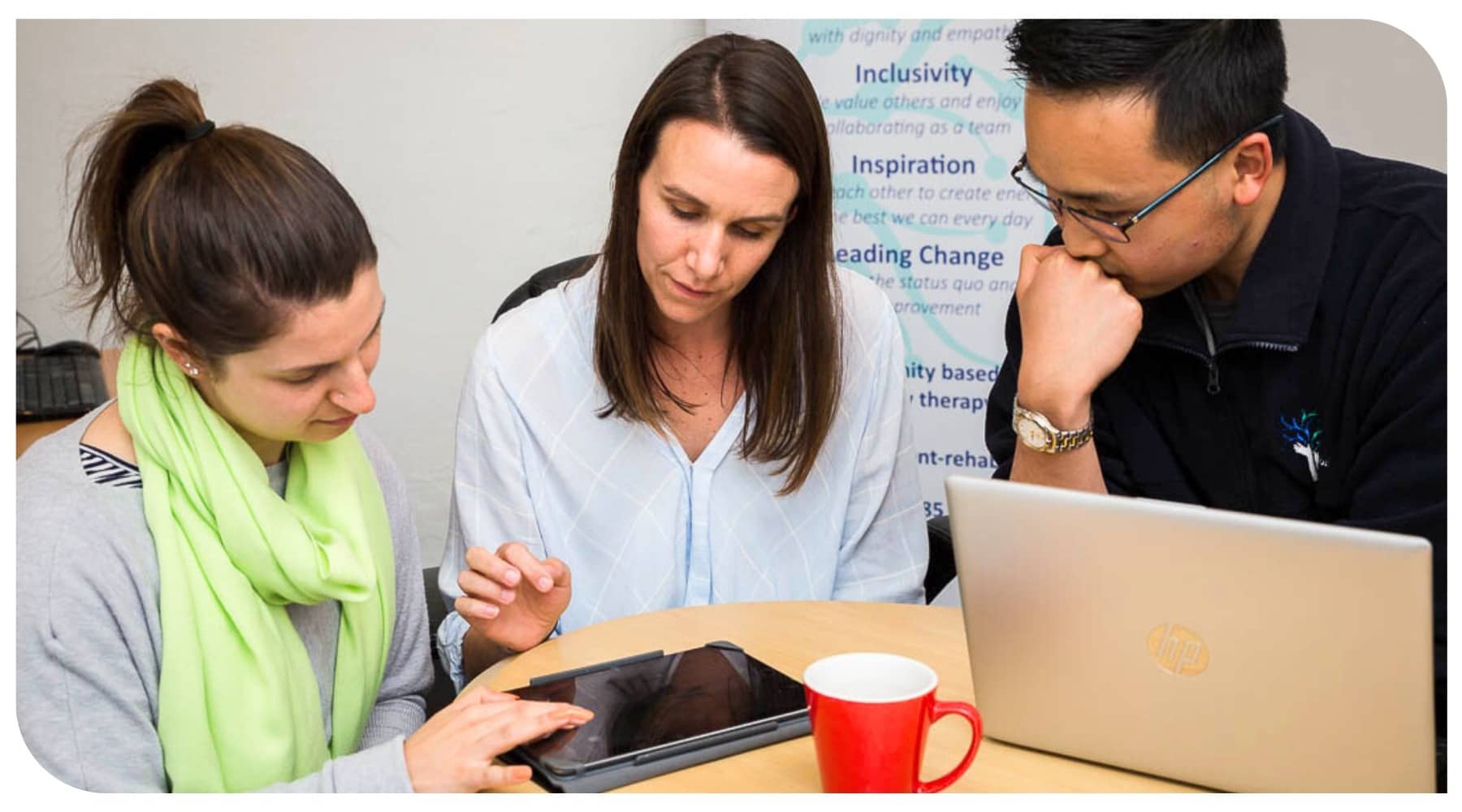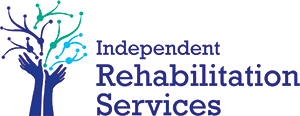Research

Independent Rehabilitation Services values evidence based practice and is committed to supporting research across all disciplines.
Exploring the feasibility of sensory modulation interventions to reduce behaviours of concern in the adult acquired brain injury population living in the community.
Funded by a grant from Traffic Accident Commission (TAC) and in collaboration with Professor Natasha Lannin1 and Dr Carla Thompson2, Independent Rehabilitation Services has recently completed a research study exploring the feasibility of sensory modulation interventions to reduce behaviours of concern in the adult acquired brain injury (ABI) population living in the community. To the best of our knowledge, this is the first study exploring the feasibility of this intervention in the community ABI population. Given the impact behaviours of concern can have on the individual, their families and carer burden, this was a much-needed study. The specific aims of this study were:
- Investigate the feasibility of providing sensory modulation interventions in a community ABI population to reduce behaviours of concern and /or increase engagement in meaningful activities
- Estimate the cost of providing sensory modulation interventions in a private community setting
- Explore occupational therapists’ perceptions of providing sensory modulation interventions in a private community setting.
Our results demonstrated that delivery of sensory modulation interventions is feasible in the community adult ABI population to reduce the frequency of behaviours of concern. An average of 27.25hrs of occupational therapy input over 16 weeks was provided to each participant to complete sensory modulation assessment and intervention within this pilot. The occupational therapists involved in this study highlighted that their ability to provide the intervention was enabled by training in sensory modulation assessments and interventions. One of the biggest challenges identified by the occupational therapists was a lack of consistency in the use of the sensory modification strategies by significant others.
While this study has demonstrated the feasibility of sensory modulation interventions in the ABI community population, further research is required to explore the effectiveness of this intervention.
1 Professor Natasha Lannin, Occupational Therapist, Alfred Health; Professor (Neurosciences), Monash University, Melbourne, Australia.
2 Dr Carla Thompson, Neuropsychologist, Memory Matters, Melbourne, Australia.
Research Project Completed 2015
An opportunity to increase independence in adults with severe traumatic brain injury: Google Calendar
Funded by Institute for Safety, Compensation and Recovery Research (ISCRR) Grant.
In collaboration with Associate Professor of Occupational Therapy Natasha Lannin from Alfred Health and LaTrobe University, Independent Rehabilitation Services has recently completed a research study into the use of Google Calendar to support prospective memory deficits post-traumatic brain injury. The aim of this study was to evaluate the use of Google Calendar with an errorless learning training package to achieve individualised functional goals after traumatic brain injury.
An opportunity to increase independence in adults with severe traumatic brain injury: Google Calendar
Petrie, Susan 1; Lannin, Natasha A.2,3,4; Phillips, Kate1; Johnson, Trish5
1 Independent Rehabilitation Services, Ashburton, Victoria, Australia
2 Occupational Therapy Department, Alfred Health, Melbourne, Australia
3 Occupational Therapy, School of Allied Health, La Trobe University, Melbourne, Australia
4 John Walsh Centre of Rehabilitation Research, Sydney Medical School (Northern), The Sydney University, Sydney, Australia
5 Speech Pathology Australia, Melbourne, Australia
Background & aims: Research suggests that technology can help adults with traumatic brain injury (TBI) to compensate for prospective memory (PM) deficits. There is a lack of research using free, mainstream programs to enhance memory after TBI. A small evidence base, from the UK, suggests that Google Calendar, (a free, mainstream electronic calendar) is an effective strategy to overcome PM deficits. This study aims to increase the evidence that Google Calendar is a feasible strategy to improve participation in TBI and to explore whether it can decrease paid care hours.
Method: Participants of this single group feasibility study were recruited from a community rehabilitation service. After a 2-week baseline period, participants received 8-weeks of Google Calendar intervention, with specifically trained occupational therapists implementing the errorless learning technique to help achieve their goals. Goals were identified and rated using the Canadian Occupational Performance Measure (COPM) and the Goal Attainment Scale (GAS). Participants engaged in a brief neuropsychological testing pre-intervention and completed the Rivermead Behavioural Memory Test 3 (RBMT 3) pre and post intervention.
Results: 12 participants completed the study, mean age of 32 (SD 9). Clinically important improvement in GAS T-Scores (mean change 19.8) and COPM performance score (p=0.003) and satisfaction scores (p=0.005) from baseline to post-intervention. There were no significant changes in memory performance (mean change 1.75 on RBMT-3) or attendant care (6.5 mean change in the number of paid care hours).
Conclusions: This study contributes to the preliminary evidence that Google Calendar is a feasible strategy to increase independence in daily activities with adults following TBI.
Correspondence: Kate Phillips; help@independent-rehab.com.au
In addition, to our main Google Calendar study, we also explored occupational therapists experiences of providing memory rehabilitation to survivors of traumatic brain injury in order to identify potential barriers to therapists providing effective memory strategies and to identify what strategies appear to work well with this client group.
Staff Publications
Brown, A., Tse, T., Fortune, T., & Petrie, S. (2021). A Scoping Review of Occupational Therapy Approaches to Enable Occupations for People Living with Behavioral Disturbance as a Result of Acquired Brain Injury. The Open Journal of Occupational Therapy, 9(4), 1-10.
Brown, A., Tse, T. & Fortune, T. (2019) Defining sensory modulation: A review of the concept and a contemporary definition for application by occupational therapists. Scandinavian Journal of Occupational Therapy, 26:7, 515-523, DOI: 10.1080/11038128.2018.1509370.
Fisher, C. & Brown, A. (2017) Sensory modulation intervention and behaviour support modification for the treatment of severe aggression in Huntington’s disease. A single case experimental design. Neuropsychological Rehabilitation. 27:6, 1-13. DOI: 10.1080/09602011.2015.109177
Toukhsati, S. R., Jovanovic, A., Dehghani, S., Tran, T., Tran, A., & Hare, D. L. (2017). Low psychological resilience is associated with depression in patients with cardiovascular disease. European Journal of Cardiovascular Nursing, 16(1), 64-69.
Brown, A., Sewell, K. & Fisher, C. (2016) Characterisation of aggression in Huntington’s disease: rates, types and antecedents in an inpatient rehabilitation setting. Journal of Clinical Nursing. 26:19. 2922-2931. DOI: 10.1111/jocn.13614
Cruz, G., Petrie, S., Goudie, N., Kersel, D., & Evans, J. (2016). Text messages reduce memory failures in adults with brain injury: A single-case experimental design. British Journal of Occupational Therapy.
Brown, A. & Fisher, C. (2015) Optimising occupational performance through sensory modulation interventions: Case reports of two young adults diagnosed with juvenile Huntington’s disease. British Journal of Occupational Therapy. 8:12. DOI: 10.1177/0308022615569249.
Fisher, C., Sewell, K., Brown, A. & Churchyard, A. (2014) Aggression in Huntington’s Disease: A Systematic Review of Rates of Aggression and Treatment Methods. Journal of Huntington’s Disease. 3:4, 319-332. DOI: 10.3233/JHD-140127.
Staff Conference and Poster Presentations
Brown, A., Rennison, M., Tse, T., Fortune, T & Petrie, S (2020, September) A gap in the literature is unveiled: how do occupational therapists contribute to behaviour support in the adult acquired brain injury population? Occupational Therapy Australia OT Exchange. Melbourne, Australia.
Rothschild, S & Brown, A (2020, September) Tele-Wheelchair Assessment: A scope of the literature and educational resource development response to the COVID- 19 pandemic. Occupational Therapy Australia OT Exchange. Melbourne, Australia.
Brown, A (2020, September) Innovating During Covid-19: Occupational Therapy Connections. A Tele-Wheelchair Education Video to Enable Occupational Participation for People Living with Acquired Brain Injury. 17 (3) pp32-33.
Phillips, K. (2019) Navigating the NDIS made for Adults with a Neurological Disability. Oral presentation completed at the APA National conference held in Adelaide on 17th-19th October.
Brown, A., Tse, T. & Fortune, T. (2019, July) Defining sensory modulation. What does the term really mean in today’s practice? A concept analysis and contemporary definition for occupational therapists. Occupational Therapy Australia National Conference. Sydney, Australia.
Cape, P. (2019) More than just a Buddy: Implementation of a peer-support program in a private community neurorehabilitation setting. Lightening talk completed at Melbourne Convention and Exhibition Centre on the 22nd March.
Pendrey, N. (2018) Training self-care routines after acquired brain injury: a scoping review. Oral presentation completed at the Vic-Tas OT conference held at Crown Promenade, Melbourne on 29th-30th June.
Brown, A. (2018, June) Sensory Modulation: What is it, really? Occupational Therapy Australia Vic-Tas Regional Conference. Melbourne, Australia.
Fisher, C.A., Brown, A., Sewell, K.E. & Moorhouse, B. (2017, March) Improving clinical management and quality of life in mid to late-stage Huntington’s disease: How research can inform clinical practice and vice versa. Culture, Diversity, Access and Equity Symposium at the Victorian Allied Health Research Conference: Allied Health Future Directions. Melbourne, Australia.
Brown, A. (2017, October) Sensory Modulation: Consider me in ABI. Annual National Acquired Brain Injury Conference. Melbourne, Australia.
Francis, B., Podesser, A., Velluto, N., Walker, C. & Davey, H. (2017). Promoting occupational therapy expertise in community based child and youth mental health. Monash Health, Melbourne, Victoria, Australia.
Petrie, S. (2017) Effective use of Google Calendar to increase daily function in the TBI population. Oral presentation completed at the Australasian Society for the Study of Brain Impairment (ASSBI), held at the Melbourne Grand Hyatt Hotel.
Jesse, A. (2017) Goal Attainment Scaling within a community-based multidisciplinary neurorehabilitation service: behaviour change and knowledge translation. Electronic poster presented at the Victorian Allied Health Research Conference: Allied Health Future Directions held at the Melbourne Convention and Exhibition Centre.
Petrie, S. (2017) Effective use of Google Calendar to increase daily function in the TBI population. Electronic poster presented at the Victorian Allied Health Research Conference: Allied Health Future Directions, held at the Melbourne Convention and Exhibition Centre. Awarded best E-poster design at the Conference.
Phillips, K. (2017) Promotion of Quality and Research in a Private Community Rehabilitation service. Oral presentation completed at the Victorian Allied Health Research Conference: Allied Health Future Directions, held at the Melbourne Convention and Exhibition Centre.
Hall, K. (2015) Occupational needs and opportunities of recently-housed, long-term homeless people. Oral presentation at the 2015 OT Australia National Conference.
Petrie, S. (2015) Google Calendar: using technology to increase independence in TBI survivors. Oral presentation at Occupational Therapy Australia national conference held in Melbourne exhibition and conference centre.
Brown, A. & Fisher, C. (2014, May) Sensory Modulation in Younger Onset Huntington’s Disease. The Annual Brain Impairment Conference for the Australasian Society for the Study of Brain Impairment (ASSBI). Perth, Australia.
Fisher, C., Brown, A. & Brown, C. (2014, May) Behaviour management in younger onset Huntington’s disease. The Annual Brain Impairment Conference for the Australasian Society for the Study of Brain Impairment (ASSBI). Perth, Australia.
Fisher, C.A., Brown, A. & Sewell, K. E. (2014, November) Aggression in Huntington’s disease. 20th APS College of Clinical Neuropsychologists Conference. Adelaide, Australia.
Jensen, A. (2014). Assistive technology: Experiences of individuals with motor neurone disease and their caregivers. Oral presentation at the National Motor Neurone Disease Conference.
Petrie, S. (2013) A strategy to improve prospective memory performance: Google Calendar. Oral presentation at the Occupational Therapy Australia National Conference held in Adelaide convention centre.
Petrie, S. (2012) Use of Google Calendar to resolve social & psychological differences. Poster presentation at the 7th World Congress for Neurorehabilitation at Melbourne Exhibition and Conference Centre.
Hashemi-Ahmady, A. & Ghul, R. (2009, June) Evaluating Participation in Occupations. Authenticity to Action Conference, Cumbria, United Kingdom.
* Current Independent Rehabilitation Services clinicians are identified above with links to their professional profile, which can be viewed on our staff page.
